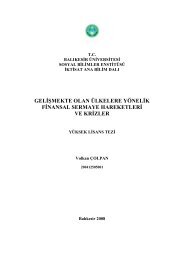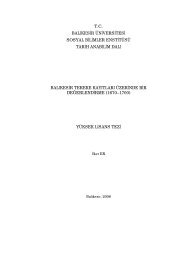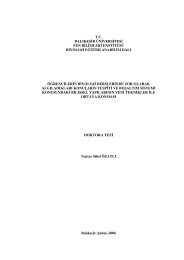tc balıkesir üniversitesi fen bilimleri enstitüsü ortaöğretim fen ve
tc balıkesir üniversitesi fen bilimleri enstitüsü ortaöğretim fen ve
tc balıkesir üniversitesi fen bilimleri enstitüsü ortaöğretim fen ve
You also want an ePaper? Increase the reach of your titles
YUMPU automatically turns print PDFs into web optimized ePapers that Google loves.
ABSTRACT<br />
THE EFFECT OF TEACHING MAGNETISM UNIT WITH COMPUTER-<br />
AIDED AND EXPERIMENT-AIDED ACTIVITIES ON 11TH GRADE<br />
STUDENTS’ SELF-EFFICACY, METACOGNITION, ATTITUDE,<br />
MOTIVATION AND CONCEPTUAL UNDERSTANDING<br />
MSC THESIS<br />
MUSTAFA ÇORAMIK<br />
BALIKESIR UNIVERSITY INSTITUTE OF SCIENCE<br />
SECONDARY SCIENCE AND MATHEMATICS EDUCATION<br />
PHYSICS EDUCATION<br />
(SUPERVISOR: ASSOC. PROF. DR. M. SABRİ KOCAKÜLAH )<br />
BALIKESİR, JUNE 2012<br />
Magnetism unit which takes place in 11th grade physics curriculum that is<br />
restructured within the scope of contructivist theory, is described as complex and<br />
hard by students. In today’s life-based education theories, learning disabilities are<br />
tried to be eliminated by using different methods and techniques and also many<br />
studies are carried out about how the students can learn more lastingly and<br />
effecti<strong>ve</strong>ly. Among these methods, experiment-aided activities and computeraided<br />
activities can also be used in learning environment.<br />
The aim of this study is to determine the effects of teaching methods<br />
applied by using experiment-aided activities and computer-aided activities on the<br />
students’ academic successes, attitudes to physics course, le<strong>ve</strong>ls of self-efficacy<br />
and metacognition, academic motivation and le<strong>ve</strong>ls of conceptual comprehension.<br />
Another aim of this study is to compare the effects of these methods with each<br />
other from the point of those variables. The sample of the research consists of 41<br />
ele<strong>ve</strong>nth grade students who study at an anatolian high school in the city centre of<br />
Balıkesir. Data collection tools are physics readiness test, physics attitude scale,<br />
academic motivation scale, self-efficacy and metacogniti<strong>ve</strong> learning scale, and<br />
magnetism unit concept test.<br />
Through the data collected by this research, it is emerged that the le<strong>ve</strong>ls of<br />
attitudes to physics course, academic motivation, self-efficacy and metacognition<br />
of the student group who are instructed with computer-aided activities are not<br />
changed. Additionaly, the academic successes of these students at magnetism unit<br />
are raised and their conceptual comprehension le<strong>ve</strong>ls are impro<strong>ve</strong>d. For the other<br />
student group who used experiment-aided activities, it is stated that the students’<br />
attitudes to physics course, their academic motivation, self-efficacy,<br />
metacognition le<strong>ve</strong>ls, academic successes and le<strong>ve</strong>ls of conceptual comprehension<br />
are impro<strong>ve</strong>d. When these two groups are compared, it is seen that the student<br />
point a<strong>ve</strong>rages of the group who experienced experiment-aided teaching are<br />
higher than the a<strong>ve</strong>rages of the group who experienced computer-aided teaching.<br />
KEYWORDS: magnetism, computer aided teaching, experiment aided teaching,<br />
physics education, attitude, self-efficacy and metacognition, motivation.<br />
ii
















